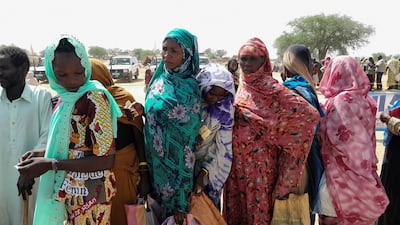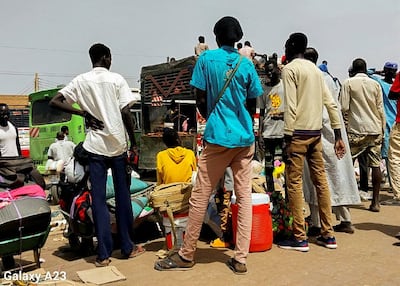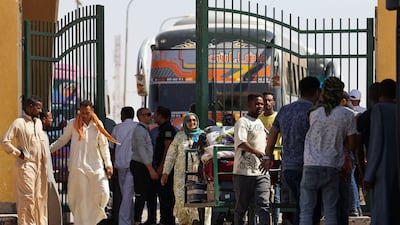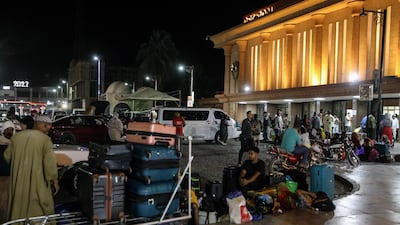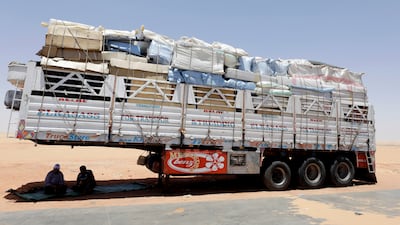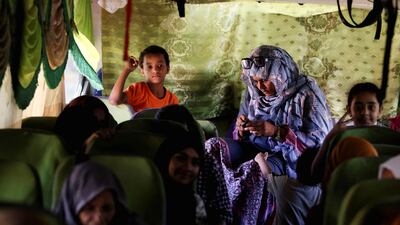Follow the latest news from the Sudan crisis here
Perhaps alone among the hundreds of Sudanese at the Karkar bus terminal in southern Egypt who fled the fighting in their homeland, Khartoum resident Ahmed Abdel Aziz is heading home.
Mr Abdel Aziz and his wife flew to Cairo with their two-month-old son on April 14, the day before fighting broke out between the army and the paramilitary Rapid Support Forces, to seek urgent medical care for the infant.
“I waited this long in Cairo in the hope that I could leave after my little child is operated on, but the doctors kept delaying the surgery until he weighs 3 kilograms,” he told The National on Saturday at the bus terminal in Karkar village, about 10 kilometres from the city of Aswan.
“I left my wife with him in Cairo and now I must return to my children in Khartoum. There are five of them, with the oldest only 12, being looked after by my elderly mother,” said Mr Abdel Aziz, who lives in the Khartoum district of Abu Adam.
“I am not afraid. I am very brave and I must return,” he said as he walked away, both armed raised in the air, a black gym bag slung over his left shoulder.
Elsewhere in the bus terminal, hundreds of Sudanese, looking fatigued and sleep deprived, disembarked from the buses that brought them from Sudan, mostly Khartoum and its suburbs.
________________________________
________________________________
Mr Abdel Aziz’s story was one of many The National heard in Karkar about lives devastated by the fighting and of the hardships endured as entire families made the long journey to Egypt.
They spoke of horror and fear, frustration and disbelief as they lived through the deadly urban warfare on the streets of Sudan's capital.
The fighting entered its third week on Saturday, with both sides paying no heed to a 72-hour ceasefire renewed the previous day.
At least 512 people have been killed and nearly 4,200 wounded, according to the Sudanese Health Ministry, although the UN believes the actual death toll may be much higher.
The fighting derailed a political process that was nearing fruition, with plans to form a civilian-led government to steer the country for 24 months until elections and for the military to quit politics and the RSF to be assimilated into the armed forces.
The fighting, while centred in Khartoum, has spread to other parts of the country, especially Darfur, where it has rekindled a two-decade-old conflict that cost 300,000 lives and displaced another 2.5 million in the 2000s.
It has also caused fuel, food, water and power shortages.
As the case has been with previous ceasefires, the army and the RSF blamed each other for Saturday’s breaches.
“The shells and bullets were hitting our home on daily basis,” said Ammar Ahmed, a 53-year-old Khartoum native from the airport district as he waited in the passenger seat of a microbus taking him, his sister and aunt to Aswan.
“It took us two hours to manoeuvre our way out of Khartoum to avoid being caught in crossfire. It was another 14 hours to the Egyptian border, two days spent there before we were processed, and here we are.”
Mr Ahmed, who works for a local non-government organisation that does social development in Sudan, spoke of widespread looting, burglaries and motorway robberies by armed gangs in the capital.
At Karkar bus terminal, a chaotic and ramshackle affair in the middle of the desert, the Sudanese refugees are met by stench from mounds of rubbish, mixed with the suffocating fumes of bus engines.
Families huddle in the little shade available, their suitcases piled up next to them. Some had no choice but to squat next to the piles of rubbish.
Food, cigarettes, tea, coffee and engine oil are on sale, as are sacks of rice and wheat-flour. Kiosks of Egyptian-based telecom companies do brisk sales of mobile phone lines as long queues form outside in the merciless noon heat.
Animated arguments between passengers and bus drivers headed to Aswan or Cairo, roughly 1,000 kilometres to the north, fill the air. The migrants pay up out of black plastic bags in which they keep wads of dollars or Egyptian pounds.
Hotel room charges and rents for flats in Aswan are also negotiated at the terminal.
“There isn’t a single bed available in Aswan now,” said an elderly man in a neatly pressed white robe as he negotiated with a Sudanese family.
As is often the case during times of war and migration, prices of everything have shot up, including bus fares.
“I will be honest with you, a seat on a bus from Khartoum to the Egyptian border used to go for $25 before the fighting. Now, it’s $250 or more, depending on how bad the fighting is at the pickup point,” said Bakry Omar, a Sudanese bus driver from the neighbourhood of Wad Nebawy in Khartoum’s twin city of Omdurman.
Wad Nebawy is a stronghold of the large Umma party and its Ansars, descendants of the men who fought with the Imam Al Mahdi during the second half of the 19th century against Turkish-Egyptian rule before they were defeated in 1899 at the hands of a British-led Anglo-Egyptian expedition.
“I don’t care who is in power in Sudan as long as I am able to feed, clothe and educate my children,” said Mr Omar, who professes support for the army against the RSF.
“They [RSF fighters] are lawless and heavy-handed. They loot and steal people’s possessions at their checkpoints,” said Mr Omar, 40, before he walked to a vendor to buy flour and rice for his family in Omdurman.
Joe Root's Test record
Tests: 53; Innings: 98; Not outs: 11; Runs: 4,594; Best score: 254; Average: 52.80; 100s: 11; 50s: 27
Why are asylum seekers being housed in hotels?
The number of asylum applications in the UK has reached a new record high, driven by those illegally entering the country in small boats crossing the English Channel.
A total of 111,084 people applied for asylum in the UK in the year to June 2025, the highest number for any 12-month period since current records began in 2001.
Asylum seekers and their families can be housed in temporary accommodation while their claim is assessed.
The Home Office provides the accommodation, meaning asylum seekers cannot choose where they live.
When there is not enough housing, the Home Office can move people to hotels or large sites like former military bases.
UAE currency: the story behind the money in your pockets
UK's plans to cut net migration
Under the UK government’s proposals, migrants will have to spend 10 years in the UK before being able to apply for citizenship.
Skilled worker visas will require a university degree, and there will be tighter restrictions on recruitment for jobs with skills shortages.
But what are described as "high-contributing" individuals such as doctors and nurses could be fast-tracked through the system.
Language requirements will be increased for all immigration routes to ensure a higher level of English.
Rules will also be laid out for adult dependants, meaning they will have to demonstrate a basic understanding of the language.
The plans also call for stricter tests for colleges and universities offering places to foreign students and a reduction in the time graduates can remain in the UK after their studies from two years to 18 months.
If you go
The flights
There are direct flights from Dubai to Sofia with FlyDubai (www.flydubai.com) and Wizz Air (www.wizzair.com), from Dh1,164 and Dh822 return including taxes, respectively.
The trip
Plovdiv is 150km from Sofia, with an hourly bus service taking around 2 hours and costing $16 (Dh58). The Rhodopes can be reached from Sofia in between 2-4hours.
The trip was organised by Bulguides (www.bulguides.com), which organises guided trips throughout Bulgaria. Guiding, accommodation, food and transfers from Plovdiv to the mountains and back costs around 170 USD for a four-day, three-night trip.
Key facilities
- Olympic-size swimming pool with a split bulkhead for multi-use configurations, including water polo and 50m/25m training lanes
- Premier League-standard football pitch
- 400m Olympic running track
- NBA-spec basketball court with auditorium
- 600-seat auditorium
- Spaces for historical and cultural exploration
- An elevated football field that doubles as a helipad
- Specialist robotics and science laboratories
- AR and VR-enabled learning centres
- Disruption Lab and Research Centre for developing entrepreneurial skills
500 People from Gaza enter France
115 Special programme for artists
25 Evacuation of injured and sick
UAE currency: the story behind the money in your pockets
EPL's youngest
- Ethan Nwaneri (Arsenal)
15 years, 181 days old
- Max Dowman (Arsenal)
15 years, 235 days old
- Jeremy Monga (Leicester)
15 years, 271 days old
- Harvey Elliott (Fulham)
16 years, 30 days old
- Matthew Briggs (Fulham)
16 years, 68 days old
Quick%20facts
%3Cul%3E%0A%3Cli%3EStorstockholms%20Lokaltrafik%20(SL)%20offers%20free%20guided%20tours%20of%20art%20in%20the%20metro%20and%20at%20the%20stations%3C%2Fli%3E%0A%3Cli%3EThe%20tours%20are%20free%20of%20charge%3B%20all%20you%20need%20is%20a%20valid%20SL%20ticket%2C%20for%20which%20a%20single%20journey%20(valid%20for%2075%20minutes)%20costs%2039%20Swedish%20krone%20(%243.75)%3C%2Fli%3E%0A%3Cli%3ETravel%20cards%20for%20unlimited%20journeys%20are%20priced%20at%20165%20Swedish%20krone%20for%2024%20hours%3C%2Fli%3E%0A%3Cli%3EAvoid%20rush%20hour%20%E2%80%93%20between%209.30%20am%20and%204.30%20pm%20%E2%80%93%20to%20explore%20the%20artwork%20at%20leisure%3C%2Fli%3E%0A%3C%2Ful%3E%0A
Specs
Engine: 51.5kW electric motor
Range: 400km
Power: 134bhp
Torque: 175Nm
Price: From Dh98,800
Available: Now
The specs
Engine: 4.0-litre flat-six
Torque: 450Nm at 6,100rpm
Transmission: 7-speed PDK auto or 6-speed manual
Fuel economy, combined: 13.8L/100km
On sale: Available to order now
The specs
Engine: 3.0-litre flat-six twin-turbocharged
Transmission: eight-speed PDK automatic
Power: 445bhp
Torque: 530Nm
Price: Dh474,600
On Sale: Now
The specs
Engine: 3.0-litre 6-cyl turbo
Power: 374hp at 5,500-6,500rpm
Torque: 500Nm from 1,900-5,000rpm
Transmission: 8-speed auto
Fuel consumption: 8.5L/100km
Price: from Dh285,000
On sale: from January 2022
SPEC SHEET
Display: 10.9" Liquid Retina IPS, 2360 x 1640, 264ppi, wide colour, True Tone, Apple Pencil support
Chip: Apple M1, 8-core CPU, 8-core GPU, 16-core Neural Engine
Memory: 64/256GB storage; 8GB RAM
Main camera: 12MP wide, f/1.8, Smart HDR
Video: 4K @ 25/25/30/60fps, full HD @ 25/30/60fps, slo-mo @ 120/240fps
Front camera: 12MP ultra-wide, f/2.4, Smart HDR, Centre Stage; full HD @ 25/30/60fps
Audio: Stereo speakers
Biometrics: Touch ID
I/O: USB-C, smart connector (for folio/keyboard)
Battery: Up to 10 hours on Wi-Fi; up to 9 hours on cellular
Finish: Space grey, starlight, pink, purple, blue
Price: Wi-Fi – Dh2,499 (64GB) / Dh3,099 (256GB); cellular – Dh3,099 (64GB) / Dh3,699 (256GB)
5 of the most-popular Airbnb locations in Dubai
Bobby Grudziecki, chief operating officer of Frank Porter, identifies the five most popular areas in Dubai for those looking to make the most out of their properties and the rates owners can secure:
• Dubai Marina
The Marina and Jumeirah Beach Residence are popular locations, says Mr Grudziecki, due to their closeness to the beach, restaurants and hotels.
Frank Porter’s average Airbnb rent:
One bedroom: Dh482 to Dh739
Two bedroom: Dh627 to Dh960
Three bedroom: Dh721 to Dh1,104
• Downtown
Within walking distance of the Dubai Mall, Burj Khalifa and the famous fountains, this location combines business and leisure. “Sure it’s for tourists,” says Mr Grudziecki. “Though Downtown [still caters to business people] because it’s close to Dubai International Financial Centre."
Frank Porter’s average Airbnb rent:
One bedroom: Dh497 to Dh772
Two bedroom: Dh646 to Dh1,003
Three bedroom: Dh743 to Dh1,154
• City Walk
The rising star of the Dubai property market, this area is lined with pristine sidewalks, boutiques and cafes and close to the new entertainment venue Coca Cola Arena. “Downtown and Marina are pretty much the same prices,” Mr Grudziecki says, “but City Walk is higher.”
Frank Porter’s average Airbnb rent:
One bedroom: Dh524 to Dh809
Two bedroom: Dh682 to Dh1,052
Three bedroom: Dh784 to Dh1,210
• Jumeirah Lake Towers
Dubai Marina’s little brother JLT resides on the other side of Sheikh Zayed road but is still close enough to beachside outlets and attractions. The big selling point for Airbnb renters, however, is that “it’s cheaper than Dubai Marina”, Mr Grudziecki says.
Frank Porter’s average Airbnb rent:
One bedroom: Dh422 to Dh629
Two bedroom: Dh549 to Dh818
Three bedroom: Dh631 to Dh941
• Palm Jumeirah
Palm Jumeirah's proximity to luxury resorts is attractive, especially for big families, says Mr Grudziecki, as Airbnb renters can secure competitive rates on one of the world’s most famous tourist destinations.
Frank Porter’s average Airbnb rent:
One bedroom: Dh503 to Dh770
Two bedroom: Dh654 to Dh1,002
Three bedroom: Dh752 to Dh1,152
The specs
Engine: 2.0-litre 4cyl turbo
Power: 261hp at 5,500rpm
Torque: 405Nm at 1,750-3,500rpm
Transmission: 9-speed auto
Fuel consumption: 6.9L/100km
On sale: Now
Price: From Dh117,059
The specs: 2017 Lotus Evora Sport 410
Price, base / as tested Dh395,000 / Dh420,000
Engine 3.5L V6
Transmission Six-speed manual
Power 410hp @ 7,000rpm
Torque 420Nm @ 3,500rpm
Fuel economy, combined 9.7L / 100km
A%20QUIET%20PLACE
%3Cp%3E%3Cstrong%3EStarring%3A%3C%2Fstrong%3E%20Lupita%20Nyong'o%2C%20Joseph%20Quinn%2C%20Djimon%20Hounsou%3C%2Fp%3E%0A%3Cp%3E%3Cstrong%3EDirector%3A%20%3C%2Fstrong%3EMichael%20Sarnoski%3C%2Fp%3E%0A%3Cp%3E%3Cstrong%3ERating%3A%3C%2Fstrong%3E%204%2F5%3C%2Fp%3E%0A
Killing of Qassem Suleimani
Killing of Qassem Suleimani







